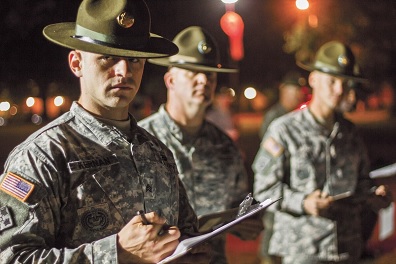10… 9… 8… 7…
It’s almost the end of the semester and – more importantly – the end of another year. I’ve never been one to take on gym memberships I likely won’t use or promise to end habits I’ll probably continue. I do, however, like the idea of fresh starts. They’re rarely total and never complete, but new beginnings – like new school years, new principals, or impeachment hearings, imply a sort of absolution for what’s past and hope for what the future could be.
In other words, January 1st is a reboot of sorts. And some of us need it more than others.
Let’s face it – no one carries around a pervading sense of guilt and inadequacy like teachers. They care deeply, feel strongly, and give muchly – often to a fault. Many of us are able to be professionally developed, pedagogically creative, and politically active, all while scoring way too high on any clinical assessment of personal dysfunctions.
I think it actually goes together – the passion for learning, the tolerance for teenagers, and the emotional mess most of us manage to be. Two sides of the same smashed penny.
Ruining the Pathology Curve
Not all teachers, of course. Some of you are relatively well-adjusted and fulfilled by a healthy variety of things in both your personal and professional lives. You can’t conceive of something a 16-year old said last Tuesday bugging you in the shower tomorrow morning. You’re perfectly dedicated, but you’d never sacrifice family time or lose actual sleep over the way 3rd hour butchered that project you were so excited about.
If that’s you, then bless you. Go with God. The rest of us find you weird, but we’re in no position to criticize. We have enough doubt and insecurity to keep us busy without trying to make you our scapegoat.
Still, you might dial it back a bit come March or things could get a bit ugly. At least show up disheveled or almost late once or twice. For the team.
Real Talk
 The rest of us aren’t merely relieved to be wrapping up the first half of the school year, but a bit surprised to have survived it at all. You may be wondering if this was really your best choice of schools, or states, or whether or not you’re even in the right profession. You may feel like you haven’t done enough for your students, or – worse – that you’ve done everything you could and it just… didn’t work.
The rest of us aren’t merely relieved to be wrapping up the first half of the school year, but a bit surprised to have survived it at all. You may be wondering if this was really your best choice of schools, or states, or whether or not you’re even in the right profession. You may feel like you haven’t done enough for your students, or – worse – that you’ve done everything you could and it just… didn’t work.
You may feel discouraged, or guilty, or pissed off – but not sure why. A few are genuinely broken, while others settle for denial and maybe a bit more wine than usual. One or two of you are thinking about turning in your keys and going to sell insurance for your brother-in-law like he keeps suggesting.
Do what you gotta do for your life and those you love, but allow me to first clarify a few things about this past semester, and these past few years for that matter. After that, well… it’s your call.
FIRST: It’s Not You, It’s Them.
There’s a foundational conundrum in public education which we don’t address as directly as we should, probably for fear of being misunderstood. It is this:
Most of the problems which manifest themselves in the classroom – from behavior to grades to curriculum to testing – originate outside of the teacher’s control. On the other hand, the only thing the teacher can directly shape is what he or she does to adjust and manage these issues, thus taking full responsibility.
Not culpability – responsibility. The kind we take on by choice because this is what we do; not the kind where it’s all our fault. The kind where we’re willing to bend over backwards trying to find solutions; not the kind where we’re the problem.
 Adrian can’t read, Garrett has anger issues, and Anaiyah won’t turn in assignments no matter how often you beg. Yes, you are the adult in the room who must figure out ways to address these issues. Yes, you are the educator who has taken responsibility for solving these problems as best you can. But you didn’t cause them. They are not your failure. They are not proof of anything about you, other than your willingness to keep trying.
Adrian can’t read, Garrett has anger issues, and Anaiyah won’t turn in assignments no matter how often you beg. Yes, you are the adult in the room who must figure out ways to address these issues. Yes, you are the educator who has taken responsibility for solving these problems as best you can. But you didn’t cause them. They are not your failure. They are not proof of anything about you, other than your willingness to keep trying.
Make like Elsa and LET IT GO. You’re killing yourself slowly with the wrong sad song. At the risk of being blunt, you’re not important enough to have messed them up this thoroughly in the short time you’ve had them, and not special enough to fix it all in a school year.
SECOND: Evaluations Aren’t Real
Unless you have a particularly enlightened and involved administration, you may safely ignore everything they say in your evaluations in terms of measuring your actual worth. You may want to jump through a few hoops to keep the rubrics happy or show you’re a “team player,” but only take official evaluations to heart if the comments resonate with you as both genuine and useful.
I’m not suggesting you grab your building rep and throw a fit in the follow-up conference. Evals are part of the gig, for both you and them. Besides, criticism can be helpful, whether it’s presented constructively or not. But most evaluations are hoops for your administration to jump through to please their bosses. They, in turn, have to keep the state happy. The system is dictated by legislators who may not even like public schooling – and who certainly have no idea what makes a successful teacher.
 Do what you gotta do to keep your gig or score that merit pay, but don’t take evals to heart if – after a reasonable period of reflection – you decide they’re neither accurate nor useful.
Do what you gotta do to keep your gig or score that merit pay, but don’t take evals to heart if – after a reasonable period of reflection – you decide they’re neither accurate nor useful.
Because they’re probably not.
THIRD: Reject Teacher Stereotypes
I suppose there are teachers out there who suck and simply don’t care. But as Peter Greene of Curmudgucation has often pointed out, there’s nothing more difficult to manage than a classroom of bored or frustrated students. Teachers who aren’t doing their best to engage the kids in front of them aren’t saving themselves from hard work; they’re making things harder on themselves.
There are times we probably could have done better. I sometimes fail to anticipate what – in retrospect – were obvious weaknesses in my planning. I’ve certainly said the wrong things, done the wrong things, and occasionally been in a completely non-helpful state of mind. So I’m certainly not suggesting we shouldn’t be self-aware enough to always be looking for ways to improve. A certain amount of suffering and frustration can be quite productive if it helps us grow.
But the idea that the entire profession is packed with slackers and people who aren’t qualified to get real jobs is nonsense. In 23 years I’ve encountered only a handful of teachers who simply aren’t any good or aren’t doing the best they can in whatever circumstances they find themselves.
FOURTH (And Most Importantly): You’re Doing Better Than You Think
“One may sows, another weeds, someone else waters… the actual reaping comes WAY later, pal.”
I’m paraphrasing a bit, but that’s totally in the Bible. It’s from the New Testament, which we don’t really use anymore, but still…
 We rarely see the long-term impact of our efforts in this business. Occasionally you’ll have a kid write something thoughtful in a card or say something at that sticks with you. From time to time, they’ll come back and visit or reach out on social media.
We rarely see the long-term impact of our efforts in this business. Occasionally you’ll have a kid write something thoughtful in a card or say something at that sticks with you. From time to time, they’ll come back and visit or reach out on social media.
Grab on to those moments and remember them. Document them if it helps. Recognize, though, that every child who does this represents another thousand or so who don’t.
It’s not that they weren’t impacted; they just don’t think about it. They may not consciously recognize the role you played in building their little lives or how much easier you made the remainder of their academic journey. Or, they may simply not be the type to make an issue of it if they do.
It doesn’t matter. You don’t need it to do your thing. What you DO need is to realize that the lack of immediate results doesn’t condemn your efforts or your methodology. Not everything we teach shows up on state test results. Some of it doesn’t show up at all until much later. Your failure to promptly cure 140 needy children in an hour a day for 180 days doesn’t mean you suck as an educator or a person.
What it suggests to me, at least, is that you’re kicking some serious ass – the way you keep showing up and trying to find new approaches and loving them even when they make it so hard. I’m amazed at how you jump through the hoops the powers-that-be keep throwing your way while still trying to hold on to what’s really important, whatever that looks like in your world.
 I don’t even mind some of the self-doubt and desperation to be better, to do more, to somehow make it all work. It may not be entirely healthy, but if it drives you forward and keeps you introspective – and that’s something.
I don’t even mind some of the self-doubt and desperation to be better, to do more, to somehow make it all work. It may not be entirely healthy, but if it drives you forward and keeps you introspective – and that’s something.
But I ask you to go into this new year without carrying so much guilt, so much manufactured failure, and so much self-doubt. See yourself as I see you, as do many others whether they tell you or not. You are a miracle worker, even if the miracles aren’t quick or clear. You are a stubborn, talented, creative, committed, pedagogical mother—
Well, you get the idea.
Don’t quit. Keep sowing, weeding, and watering. You’re going to have some big wins in 2020, and it would be a shame to miss them.
RELATED POST: Another Year Over (A New One Just Begun)
RELATED POST: Happy New Mirrors!
RELATED POST: Retaining Baby Teachers (A Tale of Ms. Hope)


 I’m sure it will surprise absolutely no one to learn that I’m not naturally the strict, by-the-book authoritarian type. In fact, I traditionally hate doing things that way – I really do.
I’m sure it will surprise absolutely no one to learn that I’m not naturally the strict, by-the-book authoritarian type. In fact, I traditionally hate doing things that way – I really do. What it does mean is that I don’t tend to be rigid about things. Most issues I address only if they become a distraction or a safety issue, or when the school or district is particularly fixated on something. Historically, I’ve been pretty flippant with my kids as well. It’s high school, they’re practically people, and the more you abuse many of them, the more convinced they are that you’re establishing a true and lasting rapport. The crap I get away with saying just to poke at them would shock and horrify anyone who doesn’t actually work with young people, but for some reason it seemed to work.
What it does mean is that I don’t tend to be rigid about things. Most issues I address only if they become a distraction or a safety issue, or when the school or district is particularly fixated on something. Historically, I’ve been pretty flippant with my kids as well. It’s high school, they’re practically people, and the more you abuse many of them, the more convinced they are that you’re establishing a true and lasting rapport. The crap I get away with saying just to poke at them would shock and horrify anyone who doesn’t actually work with young people, but for some reason it seemed to work.  I’m in a new school and a new district this year, teaching a new subject (English Language Arts – *waves-to-ELA-peeps*) This is not like any place I’ve worked before, and it probably makes sense that comes with some limitations on my tried-and-true approaches to relationships and classroom management.
I’m in a new school and a new district this year, teaching a new subject (English Language Arts – *waves-to-ELA-peeps*) This is not like any place I’ve worked before, and it probably makes sense that comes with some limitations on my tried-and-true approaches to relationships and classroom management. It’s going to have to be this year. Not for me, and not for the state tests (which are a big issue in a school on all the wrong lists). I need to find that solidity. That almost detached, seemingly unsympathetic frame of mind necessary to have real school over time. It’s doable, and it’s the right thing to do in this case, for these students in this situation. It’s still nowhere near my natural way of doing things.
It’s going to have to be this year. Not for me, and not for the state tests (which are a big issue in a school on all the wrong lists). I need to find that solidity. That almost detached, seemingly unsympathetic frame of mind necessary to have real school over time. It’s doable, and it’s the right thing to do in this case, for these students in this situation. It’s still nowhere near my natural way of doing things.
 Maybe I am, a little. I just can’t take one more podcast intro, one more author’s forward, one more introductory activity built around the assertion that prior to about 2017, all public education – particularly in subjects related to history – ran pretty much as portrayed in your typical 1980s teen comedy. (Bueller? Bueller?)
Maybe I am, a little. I just can’t take one more podcast intro, one more author’s forward, one more introductory activity built around the assertion that prior to about 2017, all public education – particularly in subjects related to history – ran pretty much as portrayed in your typical 1980s teen comedy. (Bueller? Bueller?) (Perhaps it should provide me some sense of continuity that the same basic phenomenon infects discussions of modern education policy, as the vast majority of people are quite happy with their child’s school and their kid’s teachers but remain nevertheless convinced that public education as a whole must still be a disaster.)
(Perhaps it should provide me some sense of continuity that the same basic phenomenon infects discussions of modern education policy, as the vast majority of people are quite happy with their child’s school and their kid’s teachers but remain nevertheless convinced that public education as a whole must still be a disaster.)
 Forgive me #edutwitter, for I have sinned. It’s been two weeks since my last post, but months since anything, you know… good.
Forgive me #edutwitter, for I have sinned. It’s been two weeks since my last post, but months since anything, you know… good.